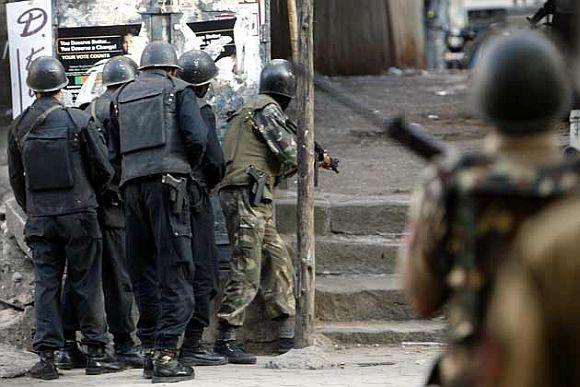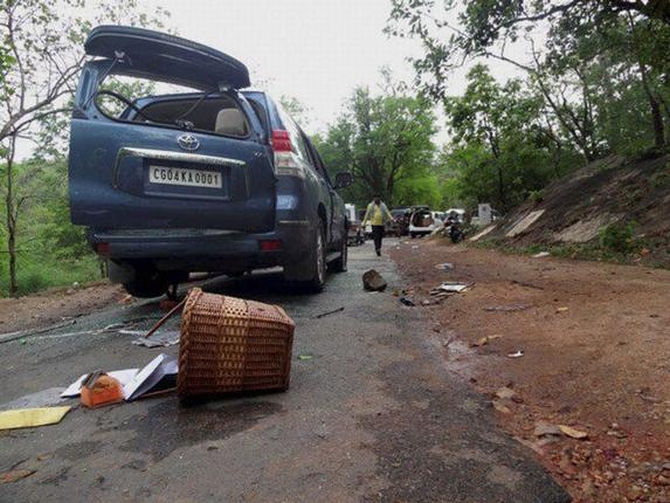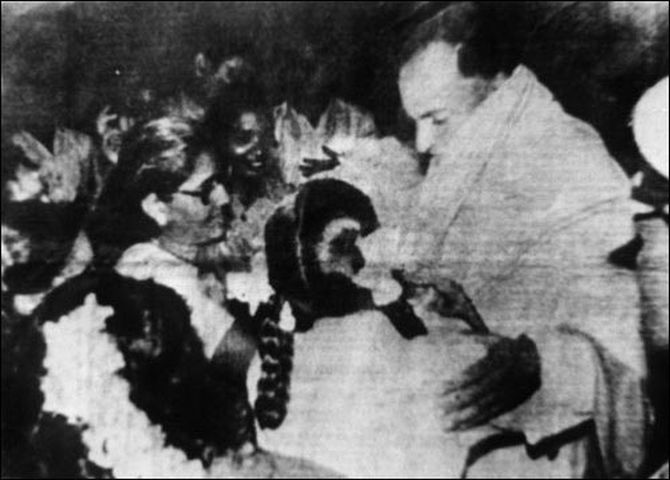
Any intelligence to be used in an operation has to be explained to the field staff. Merely retransmitting it without explaining the applicability to the local conditions will only elicit the standard response, V Balachandran tells Rediff.com’s Vicky Nanjappa
'National Security and Intelligence Management, A new paradigm' is a book by V Balachandran, former special secretary, cabinet secretariat, Government of India. The book is a compilation of Balachandran’s published works and lectures over the past 15 years on the facets of India's national security.
Balachandran, who also is a member of the high-level committee appointed to inquire into the police response to the 2008 Mumbai terrorist attacks, in an interview to Rediff.com’s Vicky Nanjappa says that 16 alerts before the attacks were not ignored, but they were not appreciated.
You make a very critical analysis of our intelligence system. You equate it to the one that was present during the Second World War. Why has India not upgraded its intelligence as yet?
There was no willingness to make reforms by successive governments or by the agencies themselves.
The idea of intelligence agencies being held accountable and the need to be supervised by outsiders started in the USA after the (president) Nixon era abuses when congressional committees were formed.
UK was a late starter when the intelligence scandals during (prime minister James Harold) Wilson's time forced them to enact the Security Service Act 1989 (For MI-5) Intelligence Services Act 1994 (For MI-5 & GCHQ). The US had already passed laws in 1947 on the National Security Council and CIA. Canada and South Africa too have passed such laws. We did not do anything since our own intelligence leadership did not want outside scrutiny.
You say in the year 2002 and 2003 there were some improvements in police reforms, but there was a decline after that. What brought about this decline? Do policy changes along with changes in governments have anything to do with it?
The reason is the unwillingness of states ruled by political parties to bring about any meaningful reforms despite Supreme Court directives. On August 30, 2010, Justice K T Thomas, who was appointed by the Supreme Court to monitor police reforms, told the media, ‘No state government wants to lose power of recruitment and transfer’.
You say it is dangerous to give the Central Bureau of Investigation constitutional status. But how do we address the problem of the Central government controlling the CBI?
As I have mentioned in a column, a totally independent investigating agency with extraordinary powers of arrest without any checks and balances does not exist in any democracy. I had quoted the American experience where the Federal Bureau of Investigation, which is not under the control of even the President and which is quoted as a model of independent investigation, is still accountable to the attorney general, courts and US attorneys. We can remove the control of Central government but some other mechanism has to be put in place to see that it does not become an ‘unruly horse’, as the Supreme Court has observed.
...

The Naxal menace is bigger than the menace of jihadi terrorism. Have steps really been taken to solve the problem. If our government claims that it has taken steps then where are we falling short in addressing the problem?
It is sad that our strategy to confront Maoists does not seem to be succeeding. Our prime minister had called upon the directors general of police (DIGs) on November 4, 2004, to treat the Maoists as ‘an even greater threat to India than militancy in Jammu & Kashmir and North East’. But ten years on, it is the same story.
We lost 15 CRPF soldiers in Bastar on March 11, 2014, in a rerun of an ambush like the 2013 Darbha Valley killings. According to a leading website, 2,633 civilians and 1,667 security personnel were killed by Maoists since 2005. This is much higher than the Kargil War casualties (527) or the 26/11 killings (166 deaths), which had shaken the nation.
The first feature that strikes any observer studying the menace of Naxalism is that there is still no national consensus on how to tackle it. There is no consensus even on whether it could be called terrorism. Unlike other forms of terrorism, which affect the urban population making an immediate impact, Naxal violence has not, except in very few cases, targeted city dwellers. This could be one reason why concerted attempts have not been made to curb the menace.
The second feature is that lofty promises made earlier have not been translated into concrete action by successive governments in Delhi or in the states. Thirdly, political parties have not been hesitant in drawing political mileage from the support base of Naxalites.
You say the UPA ignored signals from the Naxals. Can you explain this?
What we need is centralised and cooperative efforts. If we want to win a war we have to appoint one general, not 28 generals who work and speak at cross purposes.
...

Despite the Trident and the Taj being attacked during the 26/11 attack you are very critical of setting up police posts at 5-star hotels. What is the reason?
Police posts cannot know who is a genuine hotel customer. Hence they cannot screen visitors. The job of identification has to be done by the hotel security. If at all a picket is posted, the only purpose is to rush and engage terrorists who are already inside.
Experience has shown (Mumbai 26/11 attacks) that it is very difficult to dislodge a terrorist, who is willing to die, from inside a building without innocent civilians being killed. For preventing unauthorised entry, structural security arrangements have to be made. That was not done in Mumbai.
Had the hotel security detected the 2 terrorists who were about to sneak inside as customers at the Taj and locked the front entrance, they would not have been able to create havoc. Similarly, if Trident had a bulletproof locking system to shut the front entrance the 2 terrorists would not have gained entry after they fired the shots at the shops outside.
That is why Marriott, the largest hotel group in the world, had set up their own security and intelligence system in 1993, independent of the local police. In high-risk locations they protect the hotels with window film, bollards and barriers.
With experience they know who is a customer and who is not. They also have a crisis manual, a colour-coded system of alerts, the staff is briefed about tabletop exercises, consultants have been hired for terror related intelligence, so they do not have to depend on government agencies. Transferring that responsibility to a transferable policeman who may be a stranger in the field of operation is not a sufficient safeguard.
Even if police or security guards are present there is no guarantee that terror attacks will not occur: Julio Ribeiro (former Commissioner of Mumbai Police) and wife were attacked at Jalandhar police camp by terrorists dressed as policemen.
The UN office in Islamabad was attacked on October 5, 2009, by a Taliban suicide bomber dressed as a Frontier Corps (5 were killed). On October 10, 2009, Taliban militants dressed as soldiers breached security of General Headquarters, Rawalpindi (20 killed).
That is why the Singapore police never gives security to private hotels or malls unless there is a government function. Public security does not mean private security. They only patrol the streets and come in when the situation needs their intervention.
Why were 16 intelligence alerts on 26/11 ignored by the Maharashtra police?
They did not ignore it. It was a lack of appreciation. Any intelligence to be used for operations has to be explained to the field staff, which forms the cutting edge. Merely transmitting central intelligence without explaining the applicability to the local conditions will only elicit the standard response from the local staff like nakka bandis (road blocks).
In Mumbai all the attacks from 1993 were stealth bomb attacks. So when intelligence on the likelihood of attacks came, the field staff thought that it would be another bomb attack. No preventive steps to bar entry into Mumbai through the sea were taken, nor did the Central government that had issued the intelligence alerts from 2006 thought it fit to take precautions by alerting the Coast Guard or Navy.
Does our intelligence still consider the Lashkar-e-Tayiba to be only a Kashmir problem?
Not anymore. But it needed a 26/11 for them to realise that.
You say that many police officers who watched the terrorists kill their colleagues on television demoralised them. Is this how police personnel should react in such situations?
No, but this was an unprecedented situation. Even in the army, death of a commanding officer affects the morale of the troops.
...

What if 60 terrorists, as it was rumoured, invaded the city that day? How different do you think the situation would have been?
This is a hypothetical question. I can only say that the panic would have been more and it would have taken more time to kill all the terrorists.
Do you think our maritime security is up to the mark after 26/11?
No, I don't think so. The only solution is for the Coast Guard to take over the entire coastal security rather than asking the fragmented state police to patrol it without any coordination.
What is your take on the Indian Mujahideen? Is it a major threat or have we overplayed it?
On the contrary we have failed to appreciate it for so long in our eagerness to blame only Pakistan, forgetting our own homegrown jihadis. It is a major threat. I have been writing about this threat since 2004.
Why do you think the NSG arrived so late on the scene on that fateful day of 26/11?
The Central government had carefully hidden the reasons. I know that there was a standing instruction by former prime minister Rajiv Gandhi when the National Security Guard was raised to have a contingent ready in an aircraft any hour of the day, 365 days.
...

Can you explain the connection between the Kolkata kidnapping and the 9/11 attack. You made this point at Washington DC in 2003.
A chance arrest of Noor Sikandar in Mumbai in May 2003, for suspected complicity in the March 2003 Mulund blasts revealed that criminal Aftab Ansari had arranged the kidnapping of Partha Burman, owner of Kadim Shoes in Kolkata in July 2001, for a ransom of about $ 600,000.
Ansari was in a UP jail along with Jaish-e-Mohammad terrorist Saeed Omar Shaikh and were friends. Saeed was one of the terrorists released by the National Democratic Alliance government after the Kandahar hijacking.
Noor Sikandar told the police that this ransom was transferred by Ansari to Saeed through hawala channels. Saeed later sent it to Mohammad Atta -- who was accused of killing Wall Street Journal reporter Daniel Pearl.
You have said that the movie Madras café depicting the LTTE and the assassination of Rajiv Gandhi had some distorted facts. The movie claims to have decoded the conversations and failed to save the life of Rajiv Gandhi. What really happened?
There are several stages in electronic interception. First, the location of the telephone or internet link, then actual interception, then recording, later decoding and then sending it to area experts for making sense out of it. The next stage is alerting the authorities. The last stage is taking preventive steps. In Rajiv Gandhi's case these stages were not successfully gone through and the intercepted conversation remained only on tapes. The Jain Commission had mentioned this.
What do you make of the politics that surrounds the release of the LTTE terrorists who killed the former prime minister? Will releasing them give birth to another LTTE or is that movement entirely dead today?
I have no comments on that.
We had intelligence about the assassination of Gamini Dissanayake ( Sri Lankan politician and a former presidential candidate). How come we were found lacking in intelligence on Rajiv Gandhi or was it a deliberate failure?
We learnt our mistake in the Rajiv Gandhi case. It was not a deliberate failure but a faulty intelligence process. (Page 59 of National Security and Intelligence Management, A new paradigm): ‘Intelligence becomes policy only after.... as in the Kargil Crisis. This leads to a mistaken impression of 'intelligence failure'". Had these technical pointers bee converted into intelligence....None cared to process the raw product into actionable intelligence."
Click on MORE to see another PHOTO feature...